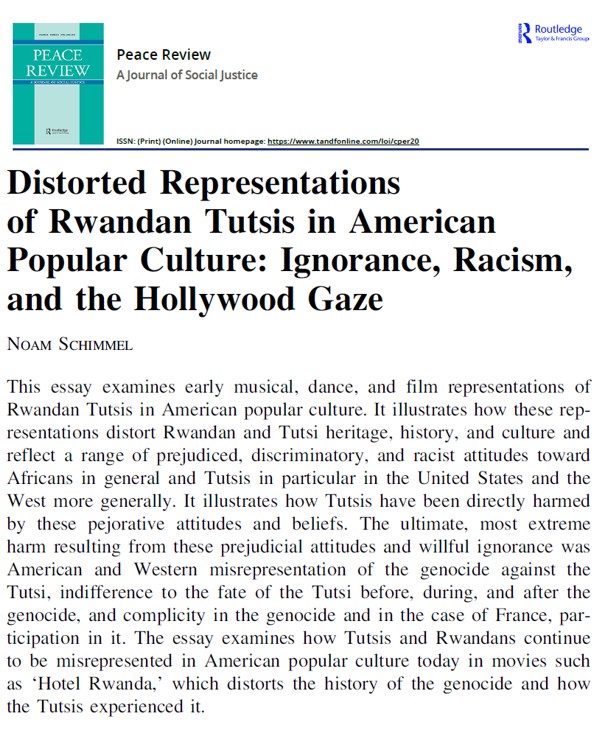
In a new article by Noam Schimmel in Peace Review: “Distorted Representations of Rwandan Tutsis in American Popular Culture: Ignorance, Racism, and the Hollywood Gaze“, he examines early musical, dance, and film representations of Rwandan Tutsis in American popular culture.
The article illustrates how these representations distort Rwandan and Tutsi heritage, history, and culture and reflect a range of prejudiced, discriminatory, and racist attitudes toward Africans in general and Tutsis in particular in the United States and the West more generally. And how Tutsis have been directly harmed by these pejorative attitudes and beliefs.
The ultimate, most extreme harm resulting from these prejudicial attitudes and willful ignorance was American and Western misrepresentation of the genocide against the Tutsi, indifference to the fate of the Tutsi before, during, and after the genocide, and complicity in the genocide and in the case of France, participation in it. The essay examines how Tutsis and Rwandans continue to be misrepresented in American popular culture today in movies such as ‘Hotel Rwanda,’ which distorts the history of the genocide and how the Tutsis experienced it.
As Schimmel concludes:
“It is time to end the grotesqueries of popular representations of Africa and Africans and to allow the voices of Rwandans and Africans more broadly – from Chinua Achebe and Wole Soyinka of Nigeria, to Wangari Maathai of Kenya, to Leymah Gbowee of Liberia and a rich and growing field of contemporary West African, East African, and Southern African writers including many women writers as well as new Rwandan memoirs and testimonies, and countless others to narrate, create, and communicate their own African stories and cultures free of prejudice, discrimination, distortion, and manipulation.
Africans, Tutsis, and Rwandans are telling their own stories, making their own music and dance, and creating their own artwork and films. A visit to Kigali and to the Rwandan countryside will yield immersion in the artwork of imigongo, of basket-weaving, ceramics, and in new contemporary painting, sculpture, and jewelry rich with creativity and originality while simultaneously rooted in Rwandan land, culture, resources, and life. It is never too late to recognize the humanity, human rights, and dignity of distant others who need not be distant ethically and emotionally, and who are only ‘other’ to the extent that they are depicted and distorted as being so.”
